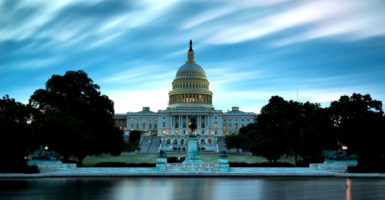Washington is broken. And American politics in 2016 seems to be a competition to assign blame for the federal government’s dysfunction, rising costs, and habitual failure to perform even its most basic responsibilities. The usual suspects offer up their favorite villains: Democrats and Republicans, conservatives and progressive, insiders and outsiders all accuse each other.
But in this case the problem is not partisan or ideological; it’s structural. The reason the federal government isn’t working today is that it isn’t working properly.
The constitutional order set up by our founders is breaking down. Specifically, the awesome powers of the federal legislative branch are increasingly being exercised by the executive and judicial branches.
Conservatives have been warning about this for years, but it seems to me we don’t take the argument to its logical conclusion. Ultimately, the problem with unchecked executive and judicial hyper-activism isn’t the activism; it’s the “unchecked” part.
The pillars of Congress’ power are its core constitutional functions: legislating, budgeting, and oversight. That’s the work representatives and senators get hired to do, and—more to the point—get fired for doing poorly. But actually using these powers—especially in an era now of real-time electronic transparency—exposes representatives and senators to the ruthless public accountability embedded in Article I.
So the safest course for Congress is not to do that work well; it’s to get out of having to do it at all, by delegating our legislative power and surrendering our authority over federal spending to the executive branch, and by relinquishing our constitutional oversight powers to the judicial branch.
Congressional weakness costs us much more than dollars. The greater loss is to our culture, measured in the distrust, even contempt, Americans now express toward our public institutions.
Despite repeated so-called “change” elections, the casual abuse and dysfunction that defines modern Washington stays the same. Problems go unsolved. Corruption is ignored. Incompetence seems, if anything, to be rewarded. With Congress’ every new abdication, our entire system of government loses a little more of its citizens’ respect, a little more of its moral legitimacy.
The only good news in all this is that what a weak Congress has broken, a strong Congress can fix. But only a strong Congress.
There is no substitute. There is only the House and Senate, their 535 members, and Congress’ collective will to do its duty to our Constitution and countrymen.
First, Congress should reassert its constitutional authority over federal regulations by requiring legislative approval of new major rules and regular re-assessments and re-authorizations of existing ones.
Second, Congress should modernize its obsolete budget process to get ourselves—and more importantly, the American people—out from under the false choice of Caesarism or shutdown.
And third, Congress should rein in executive discretion. We should empower federal judges—who now defer to executive agencies’ interpretations of laws and regulations—to conduct traditional judicial review in challenges against the administrative state.






























